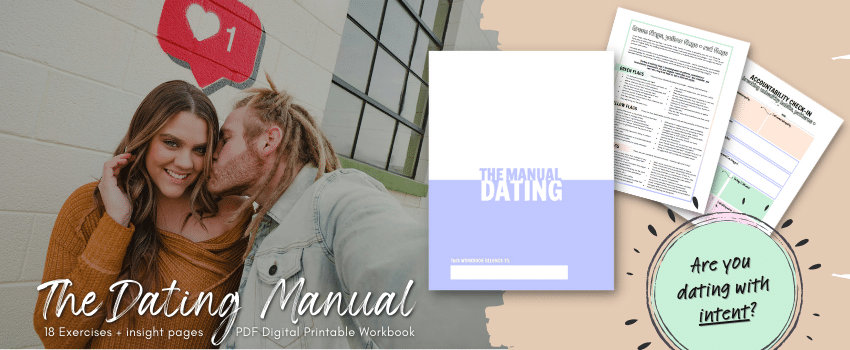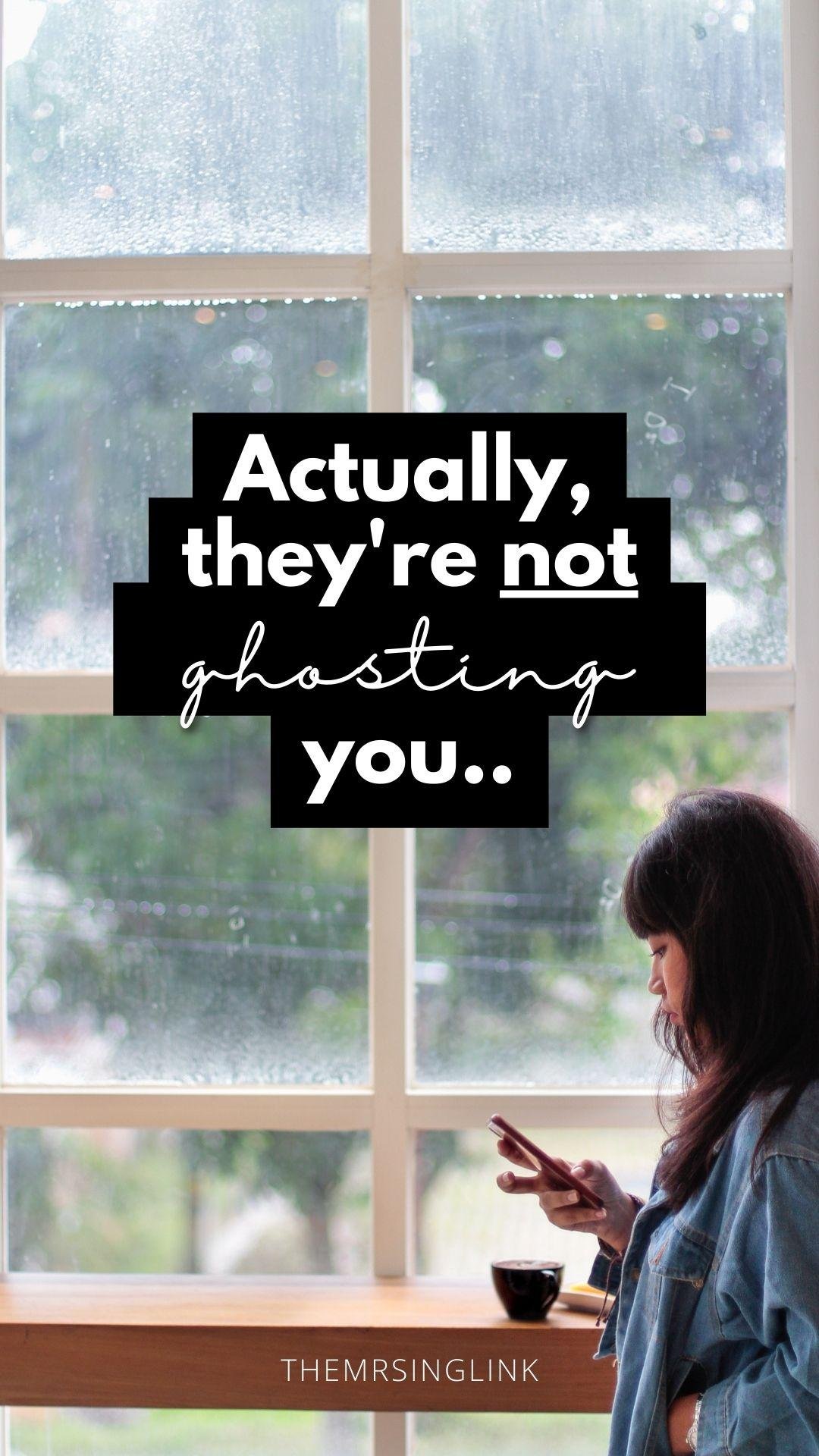Too often a label gets slapped on someone simply because we don’t like their behavior. The term ghosting in dating is one of them when, actually, he’s not ghosting you at all.
I realize I’m stepping on hot coals and that even the title is likely to jolt the frustrated and disheartened when it comes to a common dating struggle of our more recent generations. From personal experience in the dating world (and online dating realm), I had my own run-in with what would be classified as ghosting today and also being accused of ghosting.
In fact, many would say I ghosted my husband when I first met him online! I didn’t reply back after a few exchanged messages because he put the conversation to death with dead end statements. Months later he replied again (with a question this time!) asking me, “Are you alive?“, and the rest has been history now 10 married years later.
I am not, in any way, condoning poor behavior, therefore I do not approve of ghosting as a way to end a relationship or cease a connection (*yes, aside from the sometimes extreme and necessary circumstances). And from this post I am not, by any means, justifying the true nature and malicious intent behind ghosting. But let’s remember, by definition, what ghosting actually is.
It is the calculated ending of a mutually invested, intimate relationship or connection with someone by suddenly, and without explanation, withdrawing from all communication and ceasing interaction altogether.
*Exhale*.
First, we have to consider what dating means when many tend to treat it like relationships. FYI – it’s not. I don’t know about you, but for me, dating does not mean commitment or exclusivity, nor does it guarantee mutual connection or emotional investment.
The thing is, ghosting behavior has always existed – the behavior actually isn’t anything new. The term came to fruition, and its popularity of use when the behavior was exhibited in committed [exclusive], long-term relationships. But now it’s being concentrated in the dating pool.
What we unpack in this post..
I really don’t want to be the one to say this but I feel the ghosting label is widespread because people [1] are either hyper-sensitive to rejection, [2] wrongfully apply rejection to someone’s character, and [3] expect investment within a “contract-less”, non-exclusive and non-committal dynamic.
Again, I’m not condoning ghosting behavior, but we need to better understand both sides to this problem as we are increasingly throwing around the word like vomit.
Nonetheless, it definitely sucks to feel played and betrayed by someone who you felt had potential after two weeks of knowing them or after getting up close and intimate fairly early on. Hookup culture doesn’t help a ghosting epidemic, either.
Why else would society initiate dating as that buffer between singlehood and commitment if it weren’t for the sake of no strings attached? Nowadays you can be “ghosted” by someone after one date, or from solely exchanging romantic texts with for a short period of time.
With online dating as now an alternative source for romantic connection, we act like we’re not ghosting the very people who slide into our messages yet leave them on read because we simply don’t like what we see in their pictures or read on their profile. We have to be willing to draw the line somewhere without blanketly claiming disinterest as ghosting when it’s not.

Unfortunately, when technology has made it a lot easier to seek, initiate, and make connections with others, it has also made it a lot easier to throw them away, pretend they don’t exist and move on to the next without having to consider or regard the other person.
So what changed? Back then (pre social media, texting, cell phone, and even internet era) we weren’t always in constant contact. We also didn’t necessarily have the means to be anywhere, everywhere. But thanks to easy and demanding access to technology at our fingertips at all times, and in a million different avenues, we are consumed by the notion that we are entitled to zero-excuse, 24/7 access to other people’s availability, time, effort and energy. Moreover, that our feelings must be regarded tenfold on all fronts.
Honestly, it’s no wonder everyone is let down easily and so disappointed by everyone all the time. Dating in itself is no longer an anticipated pleasure, but an ever-growing pain in the a**. Its value has obviously heavily depreciated, yet we aren’t rebuking or leaning away from it.
*Phew*, and I haven’t even gotten to the good parts of this post. Bear with me.
With that said, I find the term ghosting in dating has become a default label replacement for passive disinterest and is being misused as a way to avoid dealing with our personal triggers (of rejection). So, listen up, because if you’re dating someone, they may not actually be ghosting you.
Actually, he’s not ghosting you (7 Signs)

*As always, the thoughts, opinions and beliefs throughout this post are entirely my own.
They had to address and press a violated boundary
Aside from the fact we are all likely to cross over some lines in the sand with others, even though we mean well, it may be hard of hearing or strike a nerve when someone you like calls you out on something and puts their foot down.
LBR, especially when that someone is a fresh, romantic interest, but we must acknowledge that dating boundaries do exist.
By calling you out and putting their foot down, this may be on something seemingly not-a-big-deal *to you*. I’ll even say this, yet dance around it very lightly, certain boundaries may not even exist if they really liked you. Don’t shoot the messenger, but we can’t deny this.
We might also view this behavior as overbearing or smothering. So, when you “overstepped”, say, by befriending and reaching out to their friends and siblings on Facebook after Date #1 (whom you’ve yet to meet) or bopping by their place unannounced (after having slept there for the first time the night prior), to you this may be unapologetically normal and acceptable behavior.
Except it may not be for them, and if they felt they had to address, express and press this personal boundary so early on, this can give them a lackluster impression and leave a bad taste in the mouth.
For them it’s giving red flag vibes. Therefore, if they did – in some fashion – address and reinforce a boundary (especially more than once), to which you either failed to acknowledge or respect, and they went no contact…they’re not ghosting you.
And that’s just it – there have definitely been situations where someone pushed my boundaries (i.e., dating red flags) and that sabotaged my interest in them. We can’t act like this isn’t uncommon.
In the end, there are certainly times when salvaging surface-level feelings for someone we hardly know over violated boundaries simply aren’t worth a fuss.
They spelled out their need for space
When I was dating, as an adult seeking a relationship, I still valued my space and personal time. Again, and here’s the kicker, if I was truly, truly interested in someone I was naturally inclined to less space and personal time. Yet I was still capable of declining a date (with someone I liked) simply out of preference for a self-care weekend to myself.
If I really had to spell this one out, I felt obligated to sacrifice my personal space and time and sometimes they would say things to make me feel guilty about it – ew. I’ll just leave that one there.

Bottom line is, space in relationships [on some level] is crucial. Yet we typically believe someone we’re dating who needs space is uninterested – tell me I’m wrong.
Again, as someone who programmatically requires personal time to recharge, when I was really interested in someone I actually wanted to spend as much time with them as I was able. Even if that meant burn out – FYI, which also isn’t healthy.
That being said, getting to know someone doesn’t equate to this anticipated entitlement of their sole interest, devotion, priority and time.
Either way, I think it’s safe to say that if someone you’re dating or just started dating has asked for space or *had to* demand it and, as a result, disappeared from the radar, that’s an indication that their feelings for you are not in alignment with yours for them.
And I’m sorry but this does not mean he’s ghosting you if he’s told you what he needs, and that being space or separation from you.
[Related Read: Thanks to Hookup Culture, dating is now ruined]
They’ve made their intentions known and clear
Let’s talk casual. You know, you’re with someone who strictly told you – from the beginning – that they want to keep things light, free, and open. Casual. Anything that spells *they just want to have fun* with zero strings, go with the flow, no commitments and can cancel their membership anytime (no fees and restrictions apply).
Maybe that’s you, too – you also just want casual.
Dating in and of itself is strictly casual. It doesn’t give people a free pass to be butthole human beings, but dating says, “Hey, if I don’t like you, no hard feelings, okay?” Dating means no one is tied to another, though we have the most difficult time understanding and accepting that.
Casual is why dating exists in the first place, because its self-focused at its core since the goal is to keep options open while getting to know someone. Dating is selfish – there, I said it, since many aren’t going to like it.
Dating exists because people didn’t want to be “tied down” and committed to just one person, they wanted options with an easy “out” without all the emotional chaos, nor did they want to be in anyone’s debt since dating was designed for ease and convenience. Nobody said dating was the perfect dynamic for everyone, and many will even go as far as to abuse it.
Then it is also safe to say that if someone you’re just dating has made their casual intentions clear (and have not given you any inclination that says otherwise) then it is already established that they are not bound to you. Meaning they do not have to inform you if, when, how, or why it comes to an end (between you).
Now it seems people blame vague, misleading, or indirect wording or false validation for steering them into believing feelings were mutual. The thing is if the answer is not a hard Yes, it’s a No.
So why are we assigning potential value to the things we shouldn’t? For example:
- When you ask someone if they’re looking for a relationship and their response deflects or aims to dodge an affirmative Yes, like, “If the right person comes along at the right time,” or “I don’t like to put that kind of pressure on things when you’re getting to know someone.” This is their way of going with the flow and seeking an “out” for when/if something better comes along or in order to leave the door open to simply dip.
- You notice they are treating you differently after you’ve been intimate, or because you’ve been intimate you experience failed anticipation that their feelings for you would grow exponentially and that their affection for you would show or increase. Unfortunately… sex in dating is not an indication, agreement, or confirmation of someone’s feelings, investment, intention, commitment or respect for you.
- They tell you (or even show you) they are invested in you but have never actually reinforced that it’s only you. They do this slyly by making you aware of how important/special you are (even by way of Love-bombing) and then counteracting with grossly specific red flags. There’s this distinct hot and cold behavior going on, because maintaining a level of uncertainty creates this falsified chemistry without genuine, evidential investment.
Unfortunately, the whole casual-ness aspect in dating can get a bit blurry (rightfully so if you’re not dating for exclusivity). It is that much more important to talk about and stand up for your end-goals or dating intentions upfront, which still comes with the risk of rejection and disappointment.
But if you agree to or consent to something strictly casual and they have made their casual intentions (whether by word or action) known and clear…they’re not ghosting you when they casually decide to move on to wherever the wind blows them next.
Psst, reads you also may like..
You’re not satisfied with what [answer] they’ve given you
Fact: nobody owes you anything – not even an explanation. You’ve been on a handful of dates with someone, and it’s going so well in your eyes but maybe you’re unsure on their end. Uncertainty is the red flag.
From my dating generation, as a Millennial, it wasn’t ghosting if someone was showing blatant signs of disinterest or dwindled from the limelight – stopped calling and texting, made excuses for not getting together, consistently cancelled plans, completely went MIA and was never to be seen or heard from again. That simply meant they weren’t or were no longer interested. We didn’t call it anything else – we took it at face value and moved on.
We can cry immaturity and lack of human decency all we want, but time and time again we are told by professionals that we are also allowed to change our minds and walk away, without explanation, even if that means going no contact. For instance,
- No longer entertaining drama/gossip or engaging with a friend who said things about you behind your back.
- Not responding to [flirtatious/forward] DMs, texts, or phone calls from those attempting to “pursue” you who you’re not interested in.
- Deleting/blocking accounts/individuals (on social media) that do not or no longer serve you or “spark joy” in your life.
- Going “no contact” with family members or ex-partners who are not or no longer a positive influence, support system or role model in your life.
- Declining or not responding to an offer or invitation with or without reason.
Are we reading too much into things? Yet we don’t think too much of it when we walk in those very behaviors ourselves because, “it’s okay unless someone does it to me“. That doesn’t necessarily make it okay, but I think ghosting behaviors highlight answers we’re simply not satisfied with or willing to accept. For example, in dating:
- When their effort starts to fizzle or their behavior goes hot and cold; the frequency and quality of their texts or phone calls, and their efforts to initiate, make and commit to plans dwindle. This has always been called Bread-crumbing of disinterest.
- When they are wishy-washy with their feelings for you; one minute they show you they like you and then you’re doubting it the next. They can’t be up front and honest with how they feel about you. This has always been known as emotional unavailability.
- When they refuse or fail to prioritize or consider your time, energy and effort; you continue to prioritize your energy, effort and time into them while tolerating low-quality behaviors or even maltreatment.
- When they fail to or wrongly acknowledge your innate value; they refuse to show up because they’re more focused on what you bring to the table.
Remember, poor, undesirable behavior and maltreatment is also an answer. No answer is also an answer…it’s not always ghosting. It just may not be the answer [confirmation] you’re satisfied with.

They made a claim or promise without the evidence to back it up
So they told you things like, “I really like you,“, “I really want to see you, seriously,“, “I see myself with you,” or “I only have eyes for you.” The thing is, do we understand what a false claim is in the dating world?
He says he really likes you, but that isn’t backed up when he’s blatantly shown you otherwise. He says he wants to see you and that he’s serious, but that isn’t backed up when every weekend is another excuse for why he’s going out with the boys instead.
He says he sees himself with you, but that isn’t backed up when he’s being tagged in posts with other random women. He says he only has eyes for you, but that isn’t being backed up when he follows, Likes and interacts with female models, influencers and other random women on his socials.
Ghosting occurs when there is no real evidential awareness, previous knowledge or anticipation, whereas him making false claims and promises to you is him telling you without telling you where his head and heart are at.
He’s not ghosting you, he’s indirectly or backdoor foreshadowing his intent. Unfortunately, leading you astray is simply the by-product of believing and relying on false claims to begin with.
He can’t ghost you if he wasn’t once alive
You know, a dead person was once alive, right? Well, if he’s a ghost it was because he was once alive. If he ghosts you, it was because there was once life (something real and alive) between you.
Am I starting to make sense here?
What does that look like? I mean, if I’m going to define life I’m going to call it a shared foundation – a life you built together. Or a promise you both made, agreement you shared, an account you both invested in, a bond you each nurtured, etc. etc..
It was something made up of more than just *feelings* and some fun nights out.
Does this necessarily mean you have to be in a relationship, per say? Not exactly, there are those who just date someone for a very long time (for months or years, even), so there has to be some considerable level of foundation sustained over that time.
They never actually initiated or insinuated interest in the first place
Now I understand this one can be a little confusing, because why would someone play house if they weren’t at all interested in buying? The people who ghost are predominantly those who, at one point, seem or appear interested, right? Or, rather, they’re receptive.
I think there are some pretty simple explanations to consider.
- People like to talk. Whether they’re interested romantically, find you interesting or not. We can’t act like it’s impossible to [want to] interact with someone solely out of the desire to conversate if for no further reason. The same reason we can’t assume that just because a stranger converses with you they suddenly and automatically want to be your friend.
This includes people dating online – there’s plenty of people on there who are simply seeing what it’s about, seeing what kind of people are on there, and if any possibilities ring to be true – nothing more. - People like the attention. Hello, there are those who will nurse the bottle they’re being fed even if they won’t go back for seconds. Let’s not pretend the flattery isn’t nice to enjoy without further motives, reciprocation or returning the favor.
- Ladies, there are far and FEW reasons guys will turn down an opportunity. When I say guys will shoot their shot, I mean it, whether or not it goes anywhere and regardless of their intention for it to lead anywhere in the first place.
We really can’t take every single act or word as assumed interest. Receptivity does not mean guaranteed interest, either. So when he says, “If I wasn’t interested, I wouldn’t have replied back,” we really shouldn’t automatically assign that as gospel. It’s a mere steppingstone, not absolute confirmation.
As difficult as it may be, ladies, we’re really good at taking a, “I had a really good time tonight,” as to mean, “I want to marry you.” So no wonder it burns like hell when a guy says that to ultimately never get back with you about a next date.
Fact of the matter is, the wordage is nice and all but that alone doesn’t affirm interest. He could have legitimately had a good time…when that may be totally true, but that simply be it.
We already say it enough, “They wouldn’t [reach out, ask for your number, set up a date to meet, call you the next day, text you goodnight, etc.] if they weren’t interested,“…but we really have to be careful that we aren’t labeling everything as interest or blowing things up bigger than they are, especially right off the bat.
Interest is genuine when it is built and earned, not paid. Meaning, interest isn’t based on singular words or actions, it’s a cumulative foundation. That doesn’t mean we go on claiming everything as disinterest or deceptive interest, either. A person’s true intentions are exhibited over time, consistently. Yet we tend to fall for the trickery in that a simple text response equates to the value of I Love You.
So even if he asked for your number, that doesn’t insinuate genuine interest if he never calls. You literally can’t ghost something that never was or that you didn’t have in the first place (which is cumulative proof).


